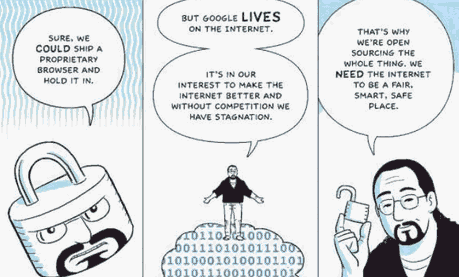Presenting, in the blue corner, Google’s announcement of its forthcoming Chrome browser – by the medium of the comic book. And in the red corner, Mr Stephen Fry’s armchair chat on the subject of GNU, the movement to create a completely free operating system.

Both are trying to do something quite peculiar: they want to give you something for nothing, and they feel they have to really push the boat out to persuade you why that’s a good idea. For the record, I’m not sure either is a presentational success. I find the comic book really hard work to read, especially when it starts talking about detailed tech stuff. And much as I hate to say it, Stephen Fry’s video piece is rather dry and a little repetitive. Maybe it needs more Alan Davies. (It certainly could do with better audio.)
Selling ‘free’ software – normally WordPress, of course – is effectively what Puffbox does. But what am I actually ‘selling’? The manifestation is usually in the form of custom theme design, selection and configuration of plugins, brainstorming of new features and functions, plus a bit of coaching and training. But fundamentally, clients are paying for my experience with the product: knowing what it’s good at, knowing how to make these things happen, and being able to do it more quickly (and hence more cheaply) than they could themselves.
And as WordPress (well, strictly Automattic) CEO Toni Schneider told the recent WordCamp in San Francisco, it’s a flourishing business. You can’t say that about much these days, can you? But then, as noted on my last piece about Internet Explorer… I really believe the £0 price tag changes all the rules.